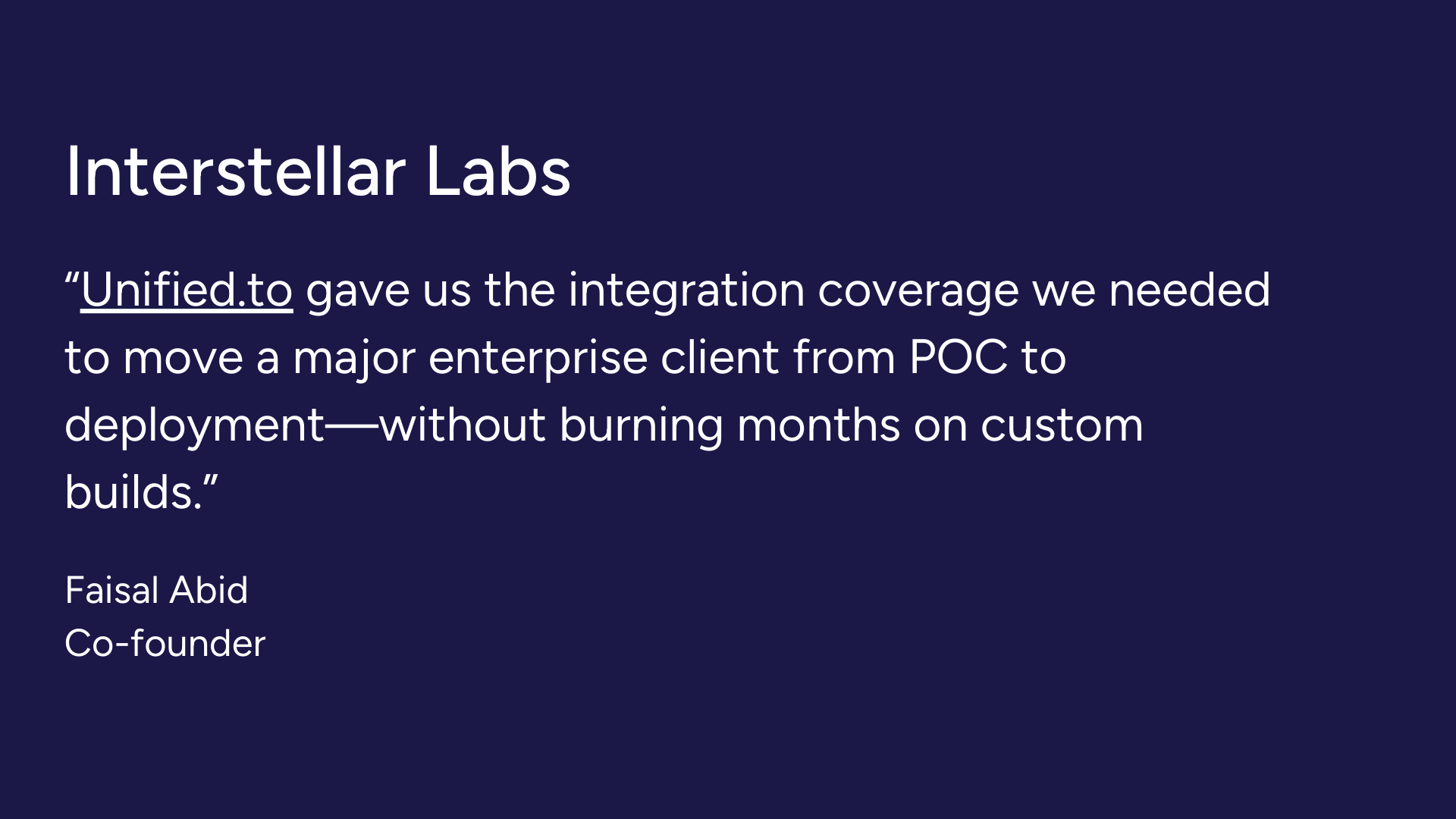How Interstellar Labs Scaled Their Agent Platform to Enterprise with Unified.to
August 20, 2025
Interstellar Labs builds AI agents for mid-market and enterprise companies, helping teams orchestrate complex workflows across fragmented SaaS stacks. As they moved upmarket, integrations became a blocker to growth. To support enterprise clients at scale, they chose Unified.to as their unified API platform.
Summary
Company: Interstellar Labs - Agent Platform
Use cases: Enable AI agents to orchestrate workflows across enterprise SaaS ecosystems
Objective: Support any enterprise tech stack without building or maintaining individual integrations
Time savings: 2+ years of engineering time avoided
Results: Secured a full-scale enterprise deployment with a Fortune 500 client after removing integration friction during the POC

Integration Demands Were Blocking Enterprise Sales
In early 2025, Interstellar Labs was gaining traction with its AI Agent platform—AI agents that orchestrate intelligent automation across enterprise stacks. The vision was compelling: specialized agents that could unify customer data, predict behaviours, and automate complex workflows across disconnected tools.
But every enterprise demo hit the same wall. 'Does it work with Greenhouse?' 'We use NetSuite, not QuickBooks.' 'Our entire sales team is on Pipedrive.' Each prospect had a unique combination of tools, and without immediate support for their stack, pilots dragged on and internal champions lost momentum.
At Interstellar Labs, only two engineers built integrations in-house. After ten weeks, they had shipped only two—Salesforce and Slack. Both were already showing cracks, with Salesforce's API changes breaking sync logic and Slack's rate limits causing delays.
At the same time, a Fortune 500 telecommunications company was evaluating the platform for enterprise-wide deployment—but required support for 50 different tools during the pilot.
From 2 Integrations to 300+ with One API
In just three months, Interstellar Labs went from supporting two hand-built integrations to offering 300+ out-of-the-box—all through a single integration with Unified.to.
What would have taken over two years of engineering time was implemented in just a few days. The team connected Unified.to's Python SDK with their Agent Development Kit (ADK), giving their agents real-time access to every supported integration across CRM, ATS, accounting, and messaging platforms.
The integration experience was straightforward, consistent, and developer-friendly. Rather than managing hundreds of OAuth flows, webhooks, and client SDKs, the team maintained a single connection with Unified.to and reused the same API patterns across every tool.
When a Fortune 500 telecom partner needed support for an unsupported new integration, the Unified.to team delivered that integration within a week — and no code changes were required from Interstellar Labs.
Integrations That Scale
The decision to use Unified.to fundamentally changed Interstellar Labs' engineering approach. Instead of maintaining hundreds of OAuth flows, webhook endpoints, and API clients, the team now maintains a single integration with Unified.to.
Implementation with their Agent Development Kit (powered by Google's ADK) was remarkably straightforward:
# Our agents work with any tool through one unified interface
from unified_to import UnifiedTo
unified = UnifiedTo(api_key=customer_key)
# Same code works regardless of which CRM the customer uses
contacts = await unified.crm.list_contacts()
# Same code for any ATS
candidates = await unified.ats.list_candidates()
# Same code for any accounting system
invoices = await unified.accounting.list_invoices()
Real-Time Data Without the Infrastructure
Interstellar Labs' agents make decisions based on live data, requiring real-time access to customer systems. Building that infrastructure internally would have required managing webhook endpoints, handling retries, dealing with rate limits, and maintaining OAuth refresh flows for hundreds of services.
Unified.to handles all of this. Its real-time architecture ensures agents always work with current data—never cached or stale. Virtual webhooks even provide real-time updates from legacy systems that don't natively support webhooks.
Accelerating Enterprise Growth
By removing integration friction, Interstellar Labs transformed its sales motion:
- Sales cycles cut by 60% – no more "we'll build that integration" delays
- POCs launch in hours – customers connect their tools and immediately see value
- Engineering stays focused – the team builds agent intelligence, not API plumbing
- Customer trust earned instantly – seeing their exact tools supported builds confidence
Every new integration Unified.to adds becomes immediately available to Interstellar Labs' customers. When Unified.to added 15 new HRIS platforms, every HR agent gained that functionality—no additional development required.
Expanding Addressable Market
Before Unified.to, every new integration request meant weeks of engineering work — slowing down sales, delaying POCs, and stalling enterprise momentum. Now they can sell to any enterprise, regardless of its tech stack. This opened up entirely new verticals:
- Financial services leveraging agents to act on CRM and accounting data across tools like Salesforce and NetSuite
- Recruiting and HR platforms integrating with ATS systems like Greenhouse, Lever, and BambooHR
- SaaS vendors with enterprise clients, where Interstellar agents orchestrate customer data across CRMs, messaging tools, and storage platforms
Each new customer can connect their full stack in under 10 minutes using Unified.to's embedded auth component. Interstellar Labs' agents immediately understand the data model and begin orchestrating workflows across all systems.
Today, Interstellar Labs no longer worries about integration gaps or maintenance overhead. With Unified.to, they can confidently scale their AI agents across any enterprise stack—faster, more reliably, and with far less engineering effort.
